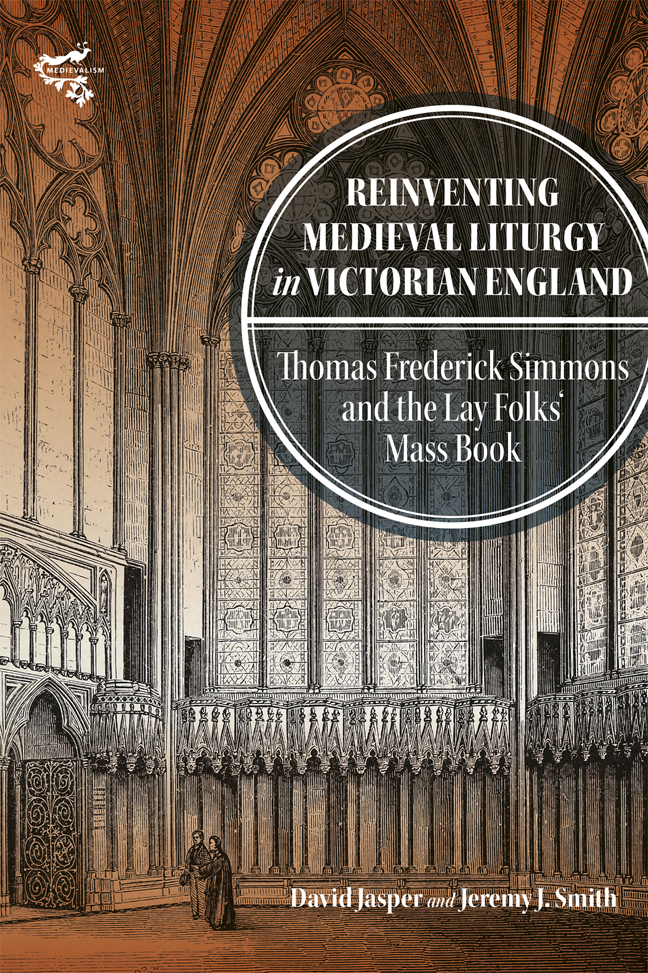 Reinventing Medieval Liturgy in Victorian England
Reinventing Medieval Liturgy in Victorian England Book contents
- Frontmatter
- Dedication
- Contents
- List of Plates
- Preface
- A note on citations
- List of abbreviations
- Introduction: Imagining the Past
- 1 Thomas Frederick Simmons and The Lay Folks’ Mass Book
- 2 Re-imagining Medieval Devotion: Nineteenth-Century Conceptions of the English Church
- 3 Simmons and the Early English Text Society
- 4 Simmons as Editor: The Philologist
- 5 Simmons as Editor: The Liturgist
- 6 Simmons as Parish Priest, and Liturgical Reform in the Victorian Church of England
- 7 The Afterlives of The Lay Folks’ Mass Book
- Conclusion: Liturgical Moments in Time
- Plates
- Appendix I The Lay Folks’ Mass Book: Text and Translation
- Appendix II The Lay Folks’ Mass Book and the Sarum Rite
- Bibliography
- Index
- Miscellaneous Endmatter
4 - Simmons as Editor: The Philologist
Published online by Cambridge University Press: 02 March 2024
- Frontmatter
- Dedication
- Contents
- List of Plates
- Preface
- A note on citations
- List of abbreviations
- Introduction: Imagining the Past
- 1 Thomas Frederick Simmons and The Lay Folks’ Mass Book
- 2 Re-imagining Medieval Devotion: Nineteenth-Century Conceptions of the English Church
- 3 Simmons and the Early English Text Society
- 4 Simmons as Editor: The Philologist
- 5 Simmons as Editor: The Liturgist
- 6 Simmons as Parish Priest, and Liturgical Reform in the Victorian Church of England
- 7 The Afterlives of The Lay Folks’ Mass Book
- Conclusion: Liturgical Moments in Time
- Plates
- Appendix I The Lay Folks’ Mass Book: Text and Translation
- Appendix II The Lay Folks’ Mass Book and the Sarum Rite
- Bibliography
- Index
- Miscellaneous Endmatter
Summary
Showing his working
At The End of the first quarter of the twenty-first century the practice of textual criticism remains as racked by controversy as it has always been. However, one positive outcome of the various debates currently circulating has been an increasing habit of reflection on the editorial craft. Tim Machan, for instance, has called for ‘editorial and interpretive self-conscious[ness, and] … greater historical sensibility in an activity that is inherently historical’ and his views have, with pithy perceptiveness, been more recently echoed by Derek Pearsall: ‘the only rule that all scholarly editors and editors of critical editions must observe is – Show your working, as we used to be exhorted when we were doing maths problems at school’. There is above all an awareness that the editorial process is not, and never has been, ‘neutral’ or ‘objective’ but is rather a hermeneutic act constrained by the conditions of publication dominant at the time of the edition’s creation, and, perhaps even more importantly, the edition’s intended audience.
Simmons himself would have agreed with all these sentiments. His inheritance from the Oxford Movement included, as we have seen, an engagement with history, linked to their concern for the catholic and apostolic nature of the English church; Newman had, for instance (and rather unfairly), criticised his high-church predecessors for their ‘lack of historical sense’. And Simmons was impressively explicit about his editorial practice, even if his manner of expression is somewhat personal for the austere critical and editorial tastes of the present day: unsurprisingly, perhaps, given his immersion in the pressing liturgical and theological debates of his time. For it is possible, on the basis of ‘The Editor’s Preface’ that he placed at the beginning of his edition, to reconstruct in detail how he set about his editorial task.
Simmons tells us that his attention was drawn to LFMB by William Maskell, who took extracts from what was to become Simmons’ B-version4 and reprinted them in his book The Ancient Liturgy of the Church of England (1844): a parallel text of the eucharistic rites of Sarum, York, Hereford and Bangor, and the Roman Liturgy. Simmons also mentions his projected edition of Archbishop Thoresby’s Catechism in English, which, later published as the Lay Folks’ Catechism, remained unfinished at his death and was completed by his friend and fellow Yorkshire clergyman, Henry Edward Nolloth.
- Type
- Chapter
- Information
- Reinventing Medieval Liturgy in Victorian EnglandThomas Frederick Simmons and The 'Lay Folks' Mass Book', pp. 67 - 94Publisher: Boydell & BrewerPrint publication year: 2023


